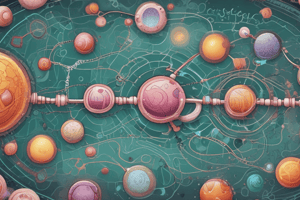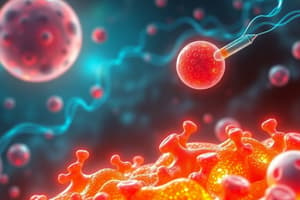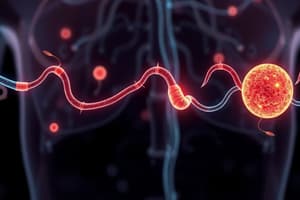Podcast
Questions and Answers
Which glucose transport mechanism does not require energy?
Which glucose transport mechanism does not require energy?
- Na+-monosaccharide cotransporter system
- Active transport system
- Na+-independent facilitated diffusion transport (correct)
- Secondary active transport
In which process is glucose synthesized from non-carbohydrate sources?
In which process is glucose synthesized from non-carbohydrate sources?
- Fermentation
- Gluconeogenesis (correct)
- Glycogenolysis
- Glycogenesis
What is the primary source of glucose during fasting conditions?
What is the primary source of glucose during fasting conditions?
- Glycogen degradation (correct)
- Dietary carbohydrates
- Gluconeogenesis
- Protein catabolism
Which glucose transporter is involved in transporting glucose coupled with the sodium gradient?
Which glucose transporter is involved in transporting glucose coupled with the sodium gradient?
What type of carbohydrates are broken down into monosaccharides by digestive enzymes?
What type of carbohydrates are broken down into monosaccharides by digestive enzymes?
Flashcards are hidden until you start studying
Study Notes
Glucose as the Key Fuel for Humans
- Constant glucose supply is essential for human life.
- Brain's preferred energy source: Glucose is the primary fuel for brain function.
- Required for cells with limited or no mitochondria: Red blood cells (RBCs) rely solely on glucose for energy as they lack mitochondria.
- Essential for exercising muscles: During physical activity, muscles utilize glucose through anaerobic glycolysis, generating energy even in the absence of oxygen.
Glucose Transport Mechanisms
- Na+-independent facilitated diffusion (GLUT):
- Glucose moves across cell membranes following its concentration gradient.
- Does not require energy (ATP).
- Facilitated by a family of at least 14 glucose transporters (GLUT-1 to 14).
- Na+-monosaccharide cotransporter system (SGLUT):
- Glucose is transported against its concentration gradient, moving from low to high concentrations.
- Requires energy.
- The movement of glucose is coupled with the transport of sodium ions (Na+) into the cell.
- This mechanism operates in the epithelial cells of the intestines and renal tubules.
Sources of Blood Glucose
- Dietary carbohydrates: Main source of glucose after meals. Excess glucose is stored as glycogen in the liver and muscles.
- Glycogen degradation (Glycogenolysis):
- Liver glycogen is broken down to release glucose during fasting.
- Muscle glycogen is broken down during exercise to provide energy for muscle activity.
- Gluconeogenesis (Glucose synthesis):
- Process of producing glucose from non-carbohydrate sources (amino acids).
- Occurs during prolonged fasting.
Dietary Carbohydrate Sources for Glucose
- Free Monosaccharides:
- Primarily glucose and fructose.
- Fructose is converted into glucose in the liver.
- Disaccharides:
- Sucrose (glucose + fructose)
- Lactose (glucose + galactose)
- Maltose (glucose + glucose)
- Digested into monosaccharides by disaccharidases (sucrase, lactase, maltase) in the small intestine.
- Fructose and galactose are converted into glucose in the liver
- Polysaccharides:
- Starch (plant source, e.g., rice, potato, flour)
- Glycogen (animal source)
- Digested by amylase into maltose, then by maltase into glucose in the gastrointestinal tract (GIT).
Fates of Blood Glucose
- Catabolic Pathways (Break down):
- Energy production (ATP):
- Glycolysis followed by the Krebs cycle
- Anaerobic glycolysis: Produces lactate
- Aerobic glycolysis: Produces pyruvate
- Synthesis of other products:
- Hexose monophosphate pathway (HMP): Generates NADPH and ribose 5-phosphate.
- Energy production (ATP):
- Synthetic Pathways (Build up):
- Glycogen synthesis
- Lipogenesis (fat synthesis)
- Protein synthesis
- Other carbohydrates
Glucose Metabolism Summary
- Hexose Monophosphate Pathway:
- Involved in NADPH and ribose-5-phosphate production.
- Glycogen Synthesis:
- Process of storing glucose as glycogen.
- Glycolysis:
- Process of breaking down glucose to pyruvate.
- Can occur with or without oxygen.
- Leads to lactate production in anaerobic conditions.
- Krebs Cycle (Citric Acid Cycle):
- Further breakdown of pyruvate to yield NADH, FADH2 and ATP.
- Electron Transport Chain:
- Utilizes NADH and FADH2 to drive oxidative phosphorylation and produce ATP.
Studying That Suits You
Use AI to generate personalized quizzes and flashcards to suit your learning preferences.




